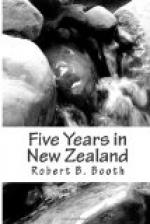CHAPTER IV.
A PERIOD OF UNCERTAINTY
AS TO OCCUPATION.—EVENTUALLY LEAVE FOR
NELSON AS CADETS ON
A SHEEP RUN.
On our return to Christchurch we were beset with a diversity of advice not calculated to bring us to a speedy decision. Some advised us to go on a sheep run for a year or two as cadets to learn the routine, with a view to obtaining thereafter an overseership, and in time a possible partnership. Others advised our setting up as carters between the Port and Christchurch, while, again, others recommended us to invest what money we possessed in land and take employment up country until we had saved enough to farm it. All advice was excellent, and had we decided on one line it would have been well, or if we had had fewer advisers perhaps it would have been better. We were waiting and talking about work instead of going at it, living at some expense, and keeping up appearances without means to support them. But it was not easy under the circumstances to decide. To go upon a sheep station and work as a labourer or overseer was very obnoxious to C——. With his home experience of farming he expected too much all at once, and naturally I was guided by him. Farming on a small scale, even if we had sufficient money to buy and work a farm, would not pay. There was not then a large enough home market for the crops produced. Land-holders held on, hoping that as the wealth of the Colony increased and the town extended and peopled, land would proportionately increase in value, and market for their produce would be found at home or abroad. But the Colony was then very young, and the staple produce of the country upon which everything depended was wool, which was only partially developed. The country was not then a tenth stocked. Sheep-farming was decidedly the thing to go in for whenever we could contrive to do so, but in the meantime what were we to take up for a living. The answer should have been simple enough. But, however, there is no need to dwell on our petty disappointments; they were only what hundreds feel and have felt who have gone to the Colonies with too sanguine expectations that it was an easy and pleasant road to fortune. That it is a road to fortune is very true, if a young man is content and determined to begin at the beginning and go steadily on; but it is not always an easy road at first for the youngster who has very little or nothing to commence upon, especially if he be a gentleman born, and has only his hands to help him. He must put his pride in his pocket and learn to be content to be taken at his present value. If he does that he will find, that his birth and education will stand to him, and that no matter what occupation he may be forced to take up, if his life and conduct be manly and reliable he will command as much or more respect from his (for the time being) fellow workers as he would do under different circumstances. It is a huge mistake to suppose that the gentleman lowers himself anywhere—and especially in the Colonies—by undertaking any kind of manual labour. I have known the sons of gentlemen of good family working as bullock-drivers, shepherds, stockdrivers, bushmen, for a yearly wage, and nobody considered the employment derogatory. On the contrary, these are the men who get on and in time become wealthy.




